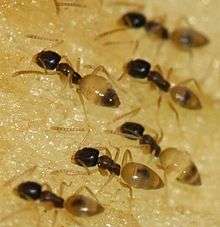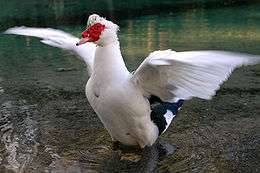Definify.com
Webster 1913 Edition
Ant
Ant
,Noun.
(Zool.)
A hymenopterous insect of the Linnæan genus
Formica
, which is now made a family of several genera; an emmet; a pismire. ☞ Among ants, as among bees, there are neuter or working ants, besides the males and females; the former are without wings. Ants live together in swarms, usually raising hillocks of earth, variously chambered within, where they maintain a perfect system of order, store their provisions, and nurture their young. There are many species, with diverse habits, as agricultural ants, carpenter ants, honey ants, foraging ants, amazon ants, etc. The white ants or Termites belong to the Neuroptera.
Ant bird
(Zool.)
, one of a very extensive group of South American birds (
– Formicariidæ
), which live on ants. The family includes many species, some of which are called ant shrikes
, ant thrushes
, and ant wrens
. Ant rice
(Bot.)
, a species of grass (
Aristida oligantha
) cultivated by the agricultural ants of Texas for the sake of its seed.Webster 1828 Edition
Ant
AN'T
, in old authors, is a contraction of an it, that is if it. [See An.]Definition 2026
ȧnt
ant
See also: Appendix:Variations of "ant"
English

A group of ants.
Alternative forms
- ante, ampte
Noun
ant (plural ants)
- Any of various insects in the family Formicidae in the order Hymenoptera, typically living in large colonies composed almost entirely of flightless females.
- 2013 July 26, Nick Miroff, “Mexico gets a taste for eating insects [… ]”, in The Guardian Weekly, volume 189, number 7, page 32:
- The San Juan market is Mexico City's most famous deli of exotic meats, where an adventurous shopper can hunt down hard-to-find critters […] . But the priciest items in the market aren't the armadillo steaks or even the bluefin tuna. That would be the frozen chicatanas – giant winged ants – at around $500 a kilo.
-
- (Internet) A Web spider.
Synonyms
Hyponyms
- (insect in Formicidae): army ant, black garden ant, bull ant, carpenter ant, fire ant, garden ant, honey-pot ant, leafcutter ant, pharaoh ant, piss ant, red ant, sauba ant, thief ant, wood ant
Derived terms
terms derived from ant
|
Translations
insect
|
|
See also
- ant- (prefix)
- -ant (suffix)
- Appendix: Animals
- army
- bike
- colony
- nest
- Appendix:English collective nouns
Verb
ant (third-person singular simple present ants, present participle anting, simple past and past participle anted)
- (ornithology) To rub insects, especially ants, on one's body, perhaps to control parasites or clean feathers.
Anagrams
Crimean Tatar
Noun
ant
Declension
Declension of ant
| nominative | ant |
|---|---|
| genitive | antnıñ |
| dative | antqa |
| accusative | antnı |
| locative | antta |
| ablative | anttan |
Synonyms
- yemin
References
- Mirjejev, V. A.; Usejinov, S. M. (2002) Ukrajinsʹko-krymsʹkotatarsʹkyj slovnyk [Ukrainian – Crimean Tatar Dictionary], Simferopol: Dolya, ISBN 966-7980-89-8
Middle Welsh
Alternative forms
- aant
Pronunciation
- IPA(key): /aːnt/
Verb
ant
- third-person plural present indicative of mynet
Turkish
Etymology
From Old Turkic ant, from Proto-Turkic *Ānt (“oath”).
Pronunciation
- IPA(key): /ˈant/
- Hyphenation: ant
Noun
ant (definite accusative andı, plural antlar)
Synonyms
- kasem
- yemin
